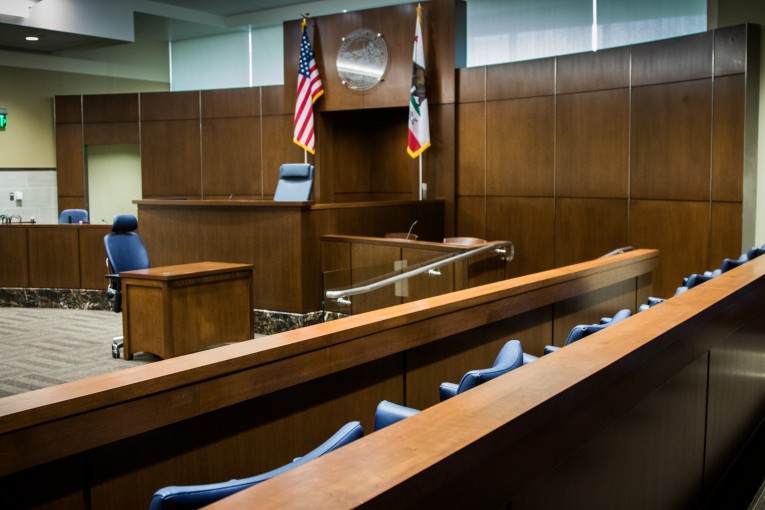

Wednesday morning at 9 a.m. the jury trial was supposed to resume for Ronald Freeman Demello, a Stockton man facing the charge of a felony hit-and-run that resulted in the death of a tow truck driver.
However, before the jury was present, both counsels, consisting of defense attorney Brian Chavez-Ochoa and Deputy District Attorney Robin Johnson, appeared before Judge David Reed with a plea deal.
Mr. Demello pleaded no contest to count one, the hit-and-run charge, as well as count two, the charge of talking on a cell phone while driving.
No formal agreement by the counsels was made on jail time Demello would receive, and an agreement will not be made until Demello’s sentencing January 16, 2018, at 9 a.m.
The plea deal will sentence Demello to probation, and if he violates this probation the maximum time in jail he will receive is one year in the county jail.
As a result of this plea deal, Judge Reed vacated the jury trial, explaining to the jurors that the parties resolved their issues. Judge Reed read the jury their final instructions and the trial ended.
Previous: Admissible Evidence and Jury Selection in Fatal Hit-and-Run Trial
by Kelsey Landon
One of the main questions asked in Department 8 on the morning of Tuesday, November 14, was how remote in time can evidence be in order to be admissible under Evidence Code section 1101 subdivision (b), a code that, in summary, allows the admission of evidence of another act a person committed, considering it relevant to prove some fact.
Defendant Ronald Freeman Demello is facing felony charges of a hit and run that resulted in the death of a tow truck driver. Demello is also facing the charge of using a wireless phone while operating a vehicle.
The motion to redact a piece of evidence was produced by Brian Chavez-Ochoa, the defense attorney representing Demello.
The piece of evidence was Demello’s driving record, which includes a hit and run incident Demello was involved in almost 30 years earlier. The deputy district attorney representing the People, 
Robin Johnson, argued that this incident was key to understanding Demello’s motive and intent.
In the end, Judge David Reed ruled Demello’s driving record as inadmissible evidence under Evidence Code section 1101(b).
Another relatively unusual motion ruled on, before the jury selection took place, was the prohibition of people entering the courtroom/house wearing or holding signs or slogans referencing the decedent, or the incident at large.
This protective order was granted after the fact that, at Demello’s preliminary hearing, friends and family of the victim filled the opposite side of the courtroom sporting t-shirts with bright slogans referencing the incident.
The judge granted this protective order on the grounds that he did not want the public to improperly introduce evidence, bias, or other factors that could result in a mistrial.
After instructing the audience of these rules, Judge Reed called for a 15-minute break before the jury selection began.
Jury selection lasted throughout the morning. The main relevant issues asked were the prospective jurors’ experience with traffic accidents, including hit and runs, and other related pieces of information about the jurors that may influence their ability to make impartial judgments on only the evidence introduced at trial.
The jury selection continued into the afternoon. The trial is expected to last at least until Friday.

So this means that he will get a year of probation after any so undecided amount of jail time?
is pretty interesting language. Why not “vehicular manslaughter”? If I legally shoot at a target or during hunting etc and kill someone and try to get away what would my likely sentence be?
Was the use of the word “accident” the court’s? It’s not an appropriate term for this kind of incident, is it? This legal firm doesn’t think so, neither does the BBC (search for the term in the Style Guide). At the very least we should make sure that our use of the word “accident” is… not an accident.
“So this means that he will get a year of probation after any so undecided amount of jail time?”
So he might get 180 days to a year in jail and when he’s released, he would be placed on three years of formal probation. (Just an example of how it could work – not saying that’s what will happen).
Todd… one does not run away from an “accident”… one runs away from a “crash” that was either deliberate, negligent, or as the result of a “stupid”… no guilt is generally attributable to an ‘accident’.. regret, shame, perhaps. So, with nuance, I’m agreeing with you that the word “accident”, given the context we are aware of, is not appropriate
Also, I understand that there is a term for “involuntary” manslaughter (not intentional, not negligent), but I’m not trained in that area of law. Seems like you recommend ‘overcharging’. Maybe incorrect in my presumption. Vehicular manslaughter I believe requires elements that are not apparent in the narrative to date, but again I’m not familiar with the nuances of the law.
The “hit” is as not as concerning to me as the “run”… no attempt to help the victim… not even a call for aid. Trying to get away from what happened. That part is deeply concerning… the “run”